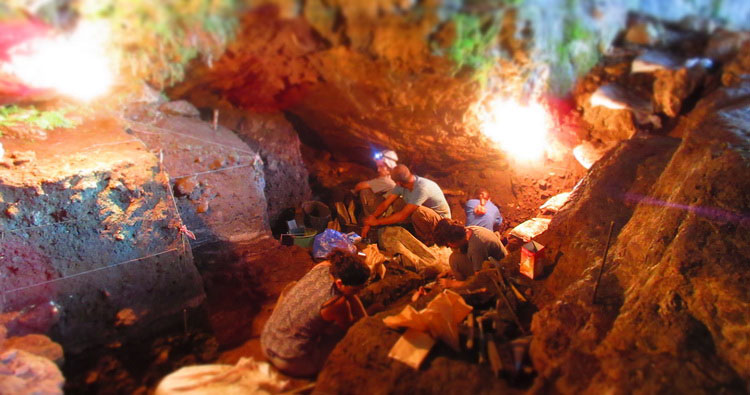Scientists decode "previously undocumented" human, wolf ancestry from Georgian archaeology site findings

International expeditions at the site between 2012-2017 unearthed material examined by the group of authors of the latest study. Photo via Georgian National Museum.
An international team of scientists has successfully sequenced genome data of three mammals including a human from skeletal remains discovered in Georgia's west, revealing "previously undocumented" ancestral lineages.
Unearthed from the Satsurblia Cave in the Tskaltubo Municipality between 2012-2017, the remains had been subjected to long studies that eventually yielded data using "shotgun" method of sequencing, giving the professionals information on Pleistocene-era sediments.
Among the key findings is a pre-Last Glacial Maximum lineage of humans - "an ancestral component of West Eurasia" - from around 25,000 years ago. The studies have also pointed to a wolf genome "basal to extant Eurasian wolves and dogs" and also previously unknown to scientists.
⛏️????⚗️ The year 2021 is being a fantastic soil and environmental DNA year in paleogenomics!. I am so excited to have contributed to this story!
— Pere Gelabert (@peregx9) July 12, 2021
checkout our new publication about Satsurblia cave genomics! ????????????????https://t.co/DVbLl8N06n
Finally, a genome of a "European bison" that served as a basis for present-day populations of the animal was also retrieved in the work that highlighted the capacity of the shotgun sequencing to "yield genome-wide data informative of ancestry and phylogenetic relationships".
Our results provide new insights into the Late Pleistocene genetic histories of these three species
- authors of the study
The results were identified from six samples of soil extracted by the professionals with a prospect of finding genomic traces. The resulting discoveries showed fragmented data that was combined to eventually present a full picture on the subjects.
Published in Current Biology journal last week, the study is submitted by a group of authors including Georgia's David Lordkipanidze, Nino Jakeli and Tengiz Meshveliani, the latter the head of the five-year interdisciplinary expedition on the site exploring Stone Age materials in present-day Tskaltubo.
The karstic Satsurblia Cave was discovered in Georgia in 1975. Located 270 metres above sea level, the 130 metre-long cave features a base of 1950 square metres, with over 320 skeletal pieces recovered from its soil.
 Tweet
Tweet  Share
Share